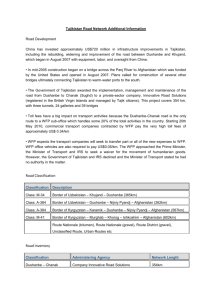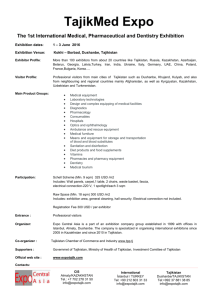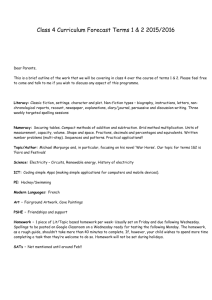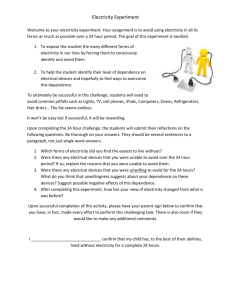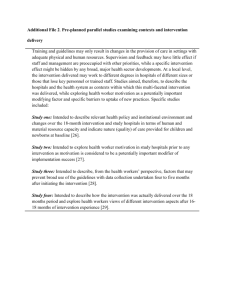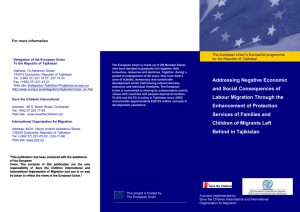Maternal and Child Survival in Extreme Winter Conditions in
advertisement
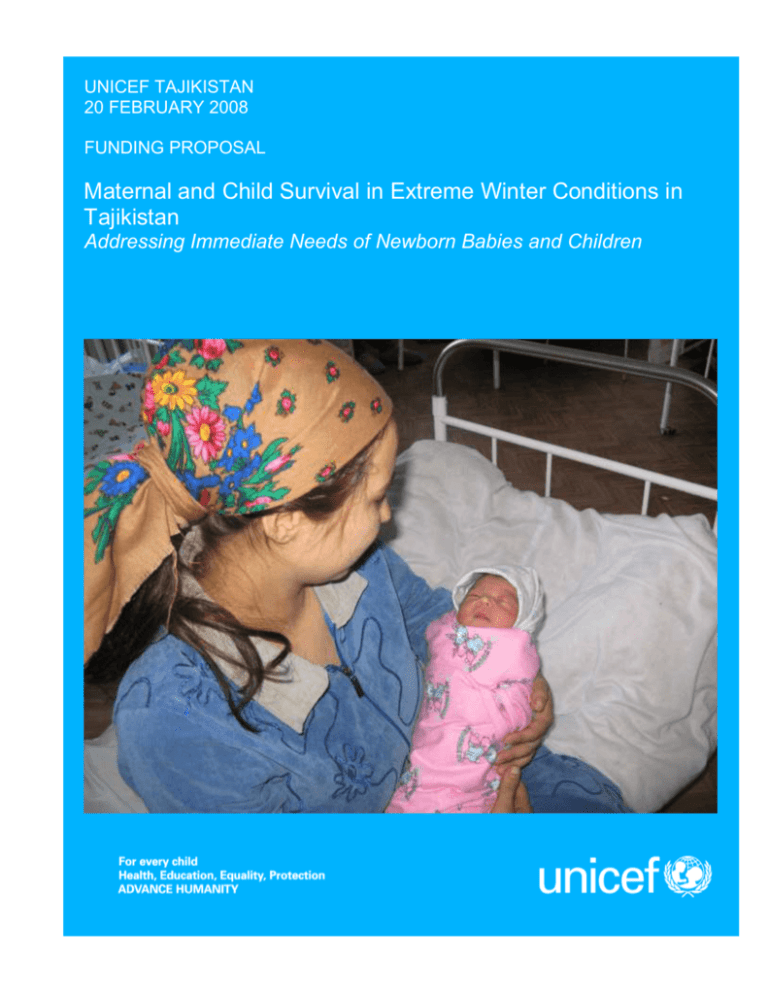
UNICEF TAJIKISTAN 20 FEBRUARY 2008 FUNDING PROPOSAL Maternal and Child Survival in Extreme Winter Conditions in Tajikistan Addressing Immediate Needs of Newborn Babies and Children Maternal and Child Survival in Extreme Winter Conditions in Tajikistan Addressing Immediate Needs of Newborn Babies and Children USD 190,000 is urgently needed to respond to the needs of the most vulnerable children and their families in Tajikistan as the country experiences the harshest winter in several decades. The sub-zero temperatures, dire shortage of water, gas and electricity is affecting the health, livelihood and well-being of the population. The current situation has severe consequences for children and specifically maternal and child survival. The rapid health assessment data showing a sharp increase in the number of severe burns and frost bite cases in the last two months. In Tajikistan 120.000 of 180.000 annual births are in rural areas. Premature babies account for almost 8 percent of newborns and they are now at risk of hypothermia. Ministry of Health statistics indicate that maternal deaths in January 2008 have more then doubled in comparison with the same period of last year. Of particular concern are schools and hospitals, which provide opportunities for the spread of disease in conditions of poor sanitation, a problem generally arising from a lack of adequate clean water. Around 60 per cent of Maternal and Child Health (MCH) hospitals have no access to safe water. Further, many urban residents use electricity for boiling water, a limited option when lengthy black outs occur, and there are few water purification alternatives. With at least two bottled water companies in Dushanbe closed due to a lack of electricity, even buying commercially purified water can be a challenge, particularly for a large family. The funds will be used to deliver essential life saving supplies including but not limited to; incubators, baby warmers, manual resuscitators, hospital new born cots, generators and midwife delivery kits. 2 Background: Tajikistan is experiencing the harshest winter in three decades with temperatures averaging -15 degree Celsius and dropping to as low as -22 degrees in the evenings. There is a dire shortage of water, gas and electricity. Most of the antiquated water lines have either broken if not clogged or frozen. Along with heating, availability of water has also become a serious crisis in most institutions such as hospitals, maternity centers, schools and child care institutions. Compounding the severe cold weather is an energy crisis that has reached emergency proportions. The country imports electricity from Turkmenistan and Uzbekistan, but it has been reduced due to power shortages in these two countries. In many villages, people receive one or two hours of electricity a day. The energy crisis in the rural areas has fueled a wave of internal migration. People have moved to live with relatives and friends who have stockpile of coal or those with relatively better power supply situation in the urban areas. The government has imposed stringent rationing of electricity and requested closure of restaurants, saunas, non-essential factories and shops and has also diverted energy from aluminum industries to the general population but still with no measurable improvement. Operation of street lights in the city has already been suspended. The risk of avalanches has increased as a result of extreme weather conditions, Data from observation stations showed that snowfall in the mountains of Anzob and Shahristan has exceeded the normal values that could result in avalanches in the central and northern regions and might likely block roads and settlements. Over a dozen people in Tajikistan have already perished under the snow avalanches since the beginning of this winter season. Of immediate concern is the water level (7 meters) in the Nurek Reservoir which, as a result of frozen inlet streams, is not being replenished at levels commensurate with off-take (average 60 cm per day). Hydroelectric experts from the World Bank in Dushanbe warned a possibility of a complete power cut in the next 10 -15 days. According to the regional weather outlook, cold temperatures and extreme weather might likely continue in February. Initial accounts from the field show the following: Cases of newborn deaths in Dushanbe maternity hospitals were reported in January 2008 due to shortage of electricity and extreme cold weather. Almost half of Maternal and Child Health hospitals in the country reported an increase of morbidity among children due to severe weather conditions including power, gas and water shortages. Some districts reported death cases. Children of all the 3800 schools and 400 kindergartens learn in extremely severe learning conditions, as most schools have almost no or very limited heating facility. Thousands of children, mostly from poor families and orphans, placed in institutions in Dushanbe, Sughd and Khatlon oblasts suffer double vulnerability. They are all affected by the electricity cuts and water shortages. The majority of institutions are provided two to seven hours electricity which is not sufficient to warm, cook and accommodate children in classrooms and bedrooms. 3 The water, sanitation and hygiene issues arising from the cold weather and electrical crisis lead to significant problems in urban areas, where water systems serve large numbers of persons. Contaminated water can rapidly spread preventable disease. Disrupted supplies (for which there are few immediate alternatives) create shortages in water for consumption, sanitation and hygiene. Damaged water supplies are already tagged as a possible source of typhoid in Kulyab. Of particular concern are schools and hospitals, which provide opportunities for the spread of disease in conditions of poor sanitation, a problem generally arising from a lack of adequate clean water. Around 60 per cent of Maternal and Child Health (MCH) hospitals have no access to safe water. Further, many urban residents use electricity for boiling water, a limited option when lengthy black outs occur, and there are few water purification alternatives. With at least two bottled water companies in Dushanbe closed due to a lack of electricity, even buying commercially purified water can be a challenge, particularly for a large family Join UNICEF to save the lives of Tajik Children Tatyana, 35, mother of four children, gave birth to her twins, just two days ago, at a maternity hospital in Dushanbe. Tatyana is trying to smile at us, but her face is a picture of anxiety as she needs to leave the hospital soon and go home… “Even though I am an experienced mother I do not know how to keep my newborn twins warm in these harsh winter conditions. I live in the city center but we were not prepared for this cold. I do not have a stove, I have an electrical heater but we have electricity only for couple of hour’s everyday.” Hasan and Hussein (twins) holding onto life, 1 day old, Maternity Hospital # 2 of Dushanbe, February 13-02-2008 Children of Tajikistan are not only suffering from the most severe winter in the last three decades and energy shortage but also a lack of life-saving emergency materials. The total population of the country is around 7M and ¾ M are children, some 50% of the population is living under the poverty line. (living on less than $ 2 a day). 4 Impact on Children Some new born deaths in maternity hospitals have been reported due to power cuts and cold. The number of acute respiratory infections and other childhood illnesses have increased. Only 19% of the hospitals and health clinics have access to electricity. Currently only twenty percent of the population has access to piped water. Access to safe drinking water is very limited, the vast majority of the population using sources that are not safe or secure. Snow prevents access to the people lives in remote areas. “Repaired” incubator, Maternity Nutrition situation is alarming and a very difficult epidemiological hospital # 2, Dushanbe situation is developing. There is high risk for infectious disease outbreak. Hospitals are in urgent need of emergency equipment like incubators, baby warmers, baby cribs and blankets especially for the newborns. UNICEF’s Response In Dushanbe, the capital of Tajikistan, UNICEF helps children for the best start in life. Some examples of the supplies already distributed include: Life-saving health kits, jerry cans, baby blankets, hygiene sets, high protein biscuits, and generators for child and maternity hospitals and residential child care institutions. The needs of the children and women are huge and urgent Your help is vital in ensuring that we can continue to deliver essential emergency supplies listed below to Tajik children affected by this compound crisis. Item Incubator Baby Warmers Resuscitator hand operation Hospital type new born cot Midwife delivery kit (enough for 50 home deliveries) Total Unit price $ 5,300 $ 800 $ 90 $ 300 $ 400 Immediate Need 20 40 100 100 30 Midterm Need 40 80 100 300 50 $ 189,000 $ 383,000 5
